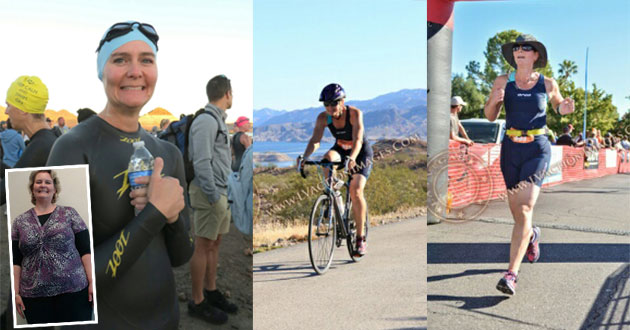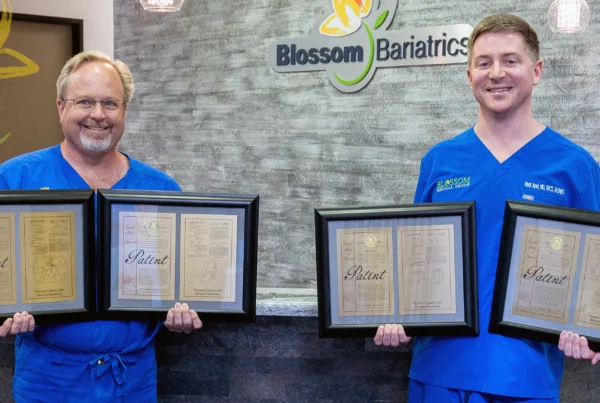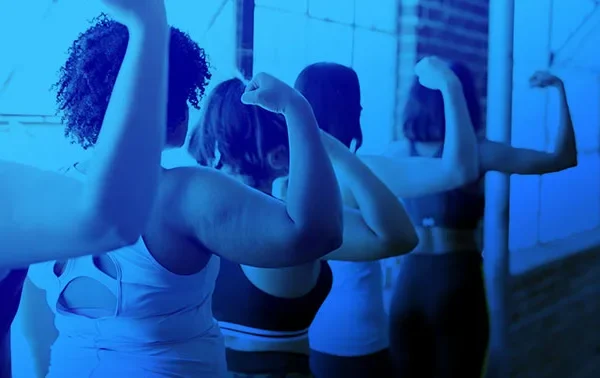When it comes to taking leaps, going from being a bariatric surgical client to becoming a triathlete is quite a jump. We sat down with Shannon Dangl, a Blossom client who found her inner athlete, to hear her story.
 Blossom: What made you decide to have surgery?
Blossom: What made you decide to have surgery?
Shannon: I fell down a flight of stairs and blew out my knee. One year after ACL surgery, I was not recovering. I realized my weight was also an issue, and knew I would never get better if I didn’t lose it. I tried every diet imaginable for years, and was never able to keep it off. I felt like I needed to do more, so I had the gastric sleeve surgery.
Blossom: Have you aspired to be an athlete your whole life? If not, how did that develop?
Shannon: I had no idea I had an athlete in me until about 4 months after surgery. I worked with a trainer to exercise more efficiently and change my relationship with food. I had an epiphany that I could do more. I texted my coach and said, “I think there may be an athlete in me somewhere!” In July 2014, I started running–it took me 1.5 hours to run 3 miles, but I kept doing it and getting better and faster. I experienced my first ‘runner’s high’ and realized the sky’s the limit. My first race was the Saints and Sinners relay in September 2014, and I ran a whole race half marathon in 2015.
Blossom: What competitions have you been in and what are your plans for future races?
Shannon: I am training for my first full marathon (26.2 miles) which will happen on March 12. My first triathlon was the Pumpkin Man in October which was from Lake Mead to Boulder City, and included running, swimming and biking. I also have a half iron in December, which is a 1.5 mile swim, 56 mile bike ride, 13.1 mile run (70.3 total miles). I’ve run 3 Ragnar’s and one Ragnar trail including the Las Vegas Ragnar twice, and the Wasatch Back Ragnar.

Blossom: What challenges have you faced in becoming an athlete?
Shannon: Trainers have a hard time with “Bari” athletes like me–those who become athletes after having bariatric surgery–they are not sure how to tell us to boost our calories for our small stomachs, so I had to design my own schedule and find what works for me. I have also developed a schedule that helps me not over-train, and avoid crash days. I find that if I run three days a week, and then swim, bike, yoga, spin and strength training the other days, I am better off than if I run all week.
Tell me about your family-How do they feel about your surgery and athletics?
I have 2 daughters ages 12 and 7. They both seem to be more happy with me since I had surgery. It used to be that I wasn’t able to keep up with them, and now they can’t keep up with me!
I recently signed them up for a kids race since my older daughter likes to race. I make sure I am just encouraging her to finish not necessarily for good time. I think if my mom would have encouraged me, I may have been different. My older daughter did well, however, my younger one made a friend along the way, and they stopped to read every sign along the way. I took the last lap with her and she told me all about it, and said, “Mom, I can’t believe you do this all the time, it’s really hard! I’m kinda tired. I think I’m done with racing for awhile.” When she crossed the finish line and got a medal, she said, “When’s the next race?”
My youngest tends to gravitate more to carbs and sugars. I talk to her about healthy eating, and the problems sugar can cause when it is a staple in your diet. After the race, she had two donuts and when we were in the car coming home, she said, “Mom, I’m done with donuts, that was too many. I think I’m done with sugar for four weeks! At the end will you give me $20 to get a doll?” She has been really diligent about the challenge, and I am really proud of her.
My mom was heavy, and I put on weight when I got married, and I never could lose it after that. I want a different life for my daughters. I’m teaching them as a means of helping the next generation, and ending the cycle here.




